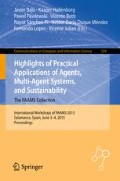Abstract
Research on agent interaction has attracted the attention of agent researchers for a long time. This paper revisits an old work to find uses of an argumentation protocol which borrows from social sciences to raise agreements among several agents. In this protocol, several agents discuss and provide a conclusion after some rounds of mutual information exchange. The work is reusing INGENIAS methodology to model and deploy the examples and illustrate benefits of this protocol proposal. It also analyses the requirements of this protocol for its application.
Access this chapter
Tax calculation will be finalised at checkout
Purchases are for personal use only
References
Cuhls, K.: Delphi method. Technical report, Fraunhofer Institute for Systems and Innovation Research (2003)
Dalkey, N., Helmer, O.: An experimental application of the Delphi method to the use of experts. Manag. Sci. 9(3), 458–467 (1963)
García-Magariño, I., Gómez-Sanz, J.J., Pérez-Agüera, J.R.: A complete-computerised Delphi process with a multi-agent system. In: Programming Multi-Agent Systems, 6th International Workshop, ProMAS 2008, Estoril, Portugal, 13 May 2008. Revised Invited and Selected Papers, pp. 120–135 (2008)
García-Magariño, I., Gómez-Sanz, J.J., Pérez-Agüera, J.R.: A multi-agent based implementation of a Delphi process. In: 7th International Joint Conference on Autonomous Agents and Multiagent Systems (AAMAS 2008), Estoril, Portugal, 12–16 May 2008, vol. 3, pp. 1543–1546 (2008)
Gomez-Sanz, J.J.: Ten years of the INGENIAS methodology. In: Shehory, O., Sturm, A. (eds.) Agent-Oriented Software Engineering, pp. 193–209. Springer, Heidelberg (2014)
Hannebauer, M.: Multi-phase consensus communication in collaborative problem solving. In: Proceedings of the Third Workshop on Communication-Based Systems, pp. 131–146. Kluwer (2000)
Holsapple, C.W., Joshi, K.D.: Knowledge manipulation activities: results of a Delphi study. Inf. Manag. 39, 477–490 (2002)
Lamport, L., Shostak, R., Pease, M.: The byzantine generals problem. ACM Trans. Program. Lang. Syst. 4(3), 382–401 (1982)
Luck, M., McBurney, P.: Computing as Interaction: Agent and Agreement Technologies, pp. 1–6. Unknown Publisher (2008)
Luehrs, R., Pavón, J., Schneider, M.: DEMOS tools for online discussion and decision making. In: ICWE, pp. 525–528 (2003)
Maudet, N., Parsons, S., Rahwan, I.: Argumentation in multi-agent systems: context and recent developments. In: Maudet, N., Parsons, S., Rahwan, I. (eds.) ArgMAS 2006. LNCS (LNAI), vol. 4766, pp. 1–16. Springer, Heidelberg (2007)
McBurney, P., Parsons, S., Wooldridge, M.: Desiderata for agent argumentation protocols. In: Proceedings of the First International Joint Conference on Autonomous Agents and Multiagent Systems: Part 1, AAMAS 2002, pp. 402–409. ACM, New York (2002)
Ossowski, S.: Agreement Technologies, vol. 8. Springer Science & Business Media, Netherlands (2012)
Pavón, J., Gómez-Sanz, J.J.: Agent oriented software engineering with INGENIAS. In: Mařík, V., Müller, J.P., Pěchouček, M. (eds.) CEEMAS 2003. LNCS (LNAI), vol. 2691, pp. 394–403. Springer, Heidelberg (2003)
Rosenschein, J.S., Zlotkin, G.: Rules of Encounter: Designing Conventions for Automated Negotiation Among Computers. MIT Press (1994)
Sabater, J., Sierra, C.: Reputation and social network analysis in multi-agent systems. In: Proceedings of the First International Joint Conference on Autonomous Agents and Multiagent Systems: Part 1, pp. 475–482 (2002)
Turoff, M., Hiltz, S.R.: Computer based Delphi processes. In: Gazing into the Oracle. The Delphi Method and Its Application to Social Policy and Public Health, pp. 56–85. Jessica Kingsley Publishers, London (1996)
Acknowledgement
We acknowledge support from the project “SOCIAL AMBIENT ASSISTING LIVING - METHODS (SociAAL)”, supported by Spanish Ministry for Economy and Competitiveness, with grant TIN2011-28335-C02-01 and by the Programa de Creación y Consolidación de Grupos de Investigación UCM-Banco Santander, call GR3/14, for the group number 921354 (GRASIA group).
Author information
Authors and Affiliations
Corresponding author
Editor information
Editors and Affiliations
Rights and permissions
Copyright information
© 2015 Springer International Publishing Switzerland
About this paper
Cite this paper
Gomez-Sanz, J.J., Fernandez, R.F. (2015). Revisiting the Delphi Method for Agents. In: Bajo, J., et al. Highlights of Practical Applications of Agents, Multi-Agent Systems, and Sustainability - The PAAMS Collection. PAAMS 2015. Communications in Computer and Information Science, vol 524. Springer, Cham. https://doi.org/10.1007/978-3-319-19033-4_32
Download citation
DOI: https://doi.org/10.1007/978-3-319-19033-4_32
Published:
Publisher Name: Springer, Cham
Print ISBN: 978-3-319-19032-7
Online ISBN: 978-3-319-19033-4
eBook Packages: Computer ScienceComputer Science (R0)

